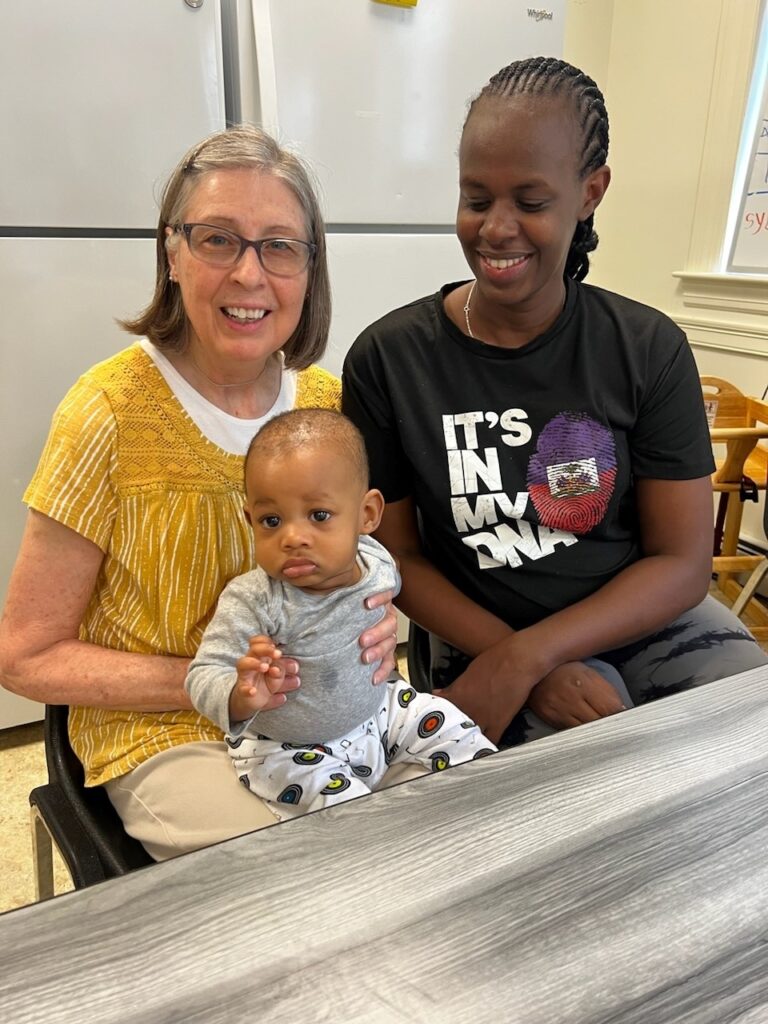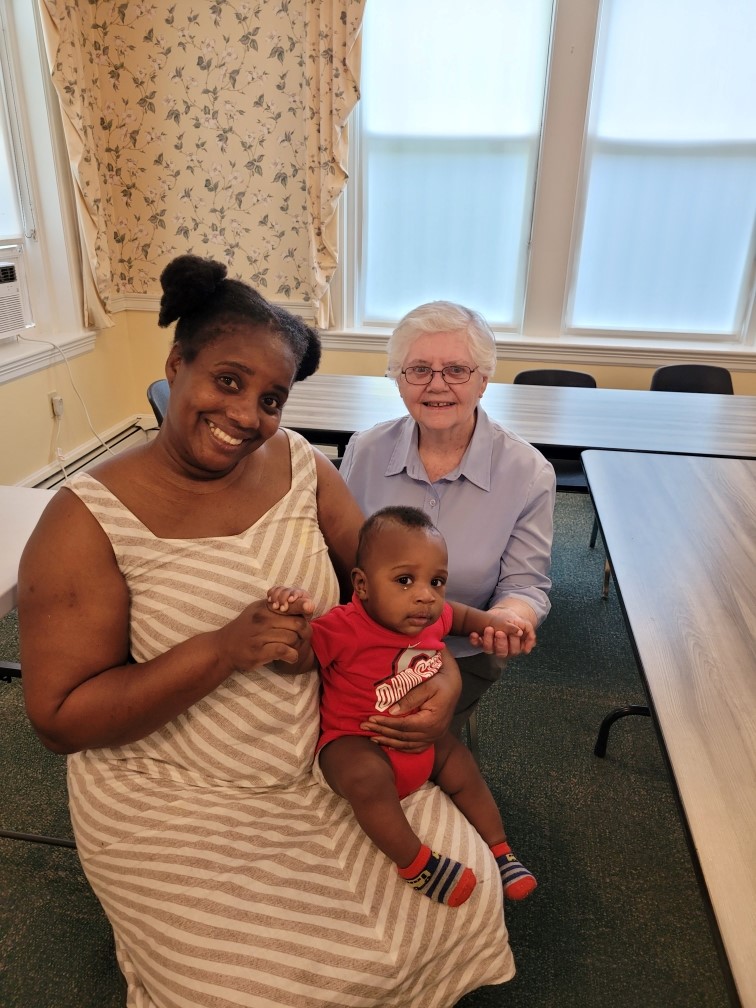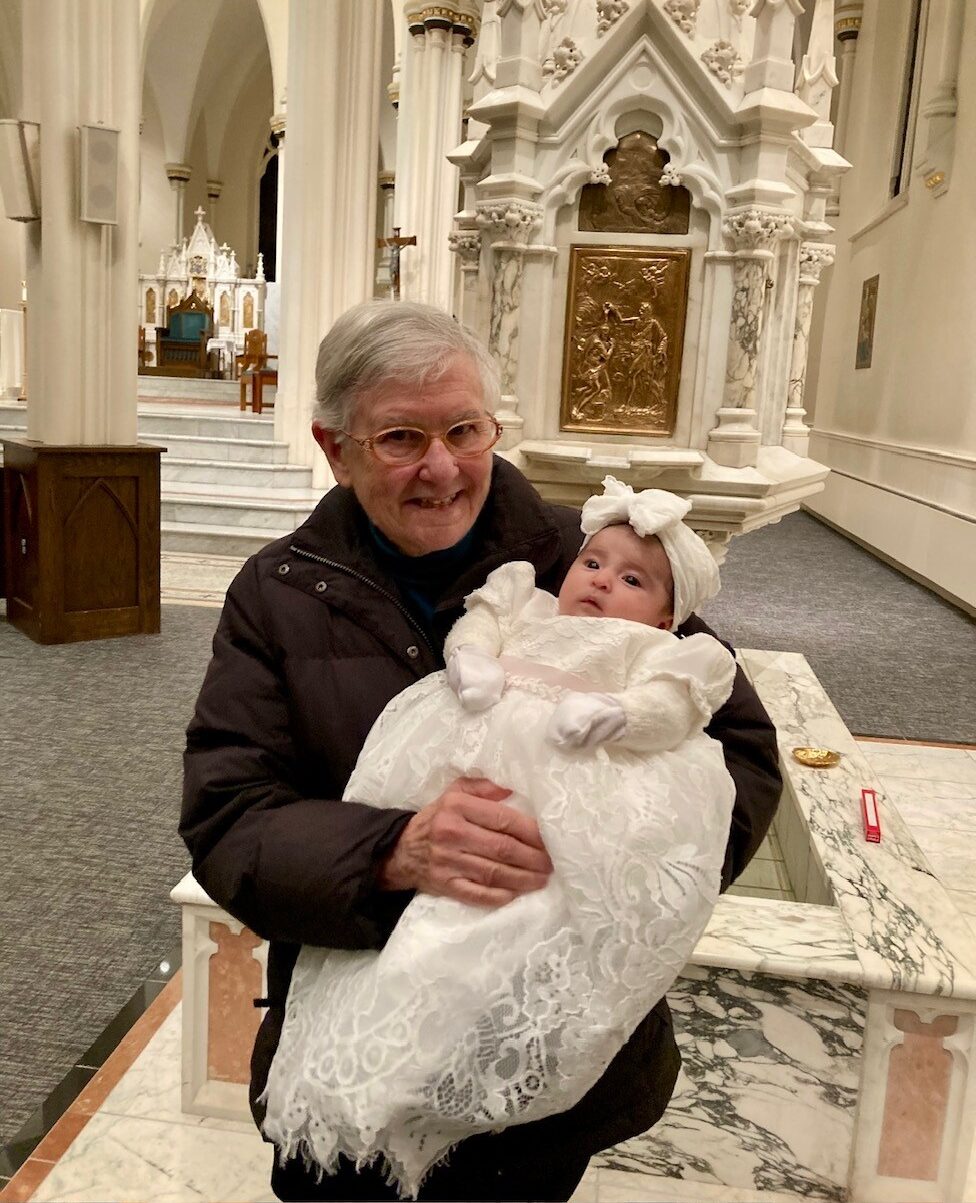‘Like mothers and grandmothers’: Maine sisters walk with migrant women and children
By Catherine Walsh, Senior Writer
Marie, an immigrant from Rwanda, lights up when she talks about her friendship with Sister Anne-Marie Bourque. “I love her! She is like my mother and my children’s grandmother, and I don’t do anything without asking her advice.”
Marie and her children live at Frances Warde House, the former retirement convent of the Sisters of Mercy in Portland, Maine, that now serves as a transitional shelter for migrant women and children at risk for homelessness. Sister Anne-Marie and Sister Mary Miller, who thought they would one day live in the convent, now volunteer there, helping residents to learn English, and more importantly, providing support to these newcomers navigating a land far from their homes.

The house is run by In Her Presence, a nonprofit that in partnership with Northern Light Mercy Hospital and other organizations opened the shelter last year in response to the unprecedented numbers of pregnant women arriving in Maine from Africa and elsewhere.
Newly retired from her ministry as a hospital chaplain, Sister Anne-Marie started volunteering at the house because she yearned to embody Frances Warde, who helped countless immigrants. “I entered the Sisters of Mercy because of her,” she says.
The former teacher began helping Marie’s daughter Isheja (pronounced “EYE-Shay-Ja”), now five, get ready for kindergarten. In the process she and the child’s mother have become close. She is godmother to her son Andy and helped Isheja to get a scholarship at Holy Cross School in South Portland where she once taught third grade.
Marie can’t imagine life without her friend. “Sister Anne-Marie has a good heart. She helps me with so many things,” she says simply.
The elegant woman in her mid-30s shares more of her story in an interview. “Life in Rwanda is no good,” she says. “You may eat today but you don’t know if you will eat tomorrow.”
A lack of jobs – she has a bachelor’s degree and administrative skills – led her to seek a green card, which she received two years ago.
She emigrated to Portland with her daughter, and later married Sandy, a Haitian migrant. Their combined earnings made them ineligible for affordable housing, so they had to live apart, as men cannot stay at Frances Warde House. The family have since found an apartment.
“Staying here is like VIP treatment,” says Marie about the comfortable house in a leafy neighborhood. “But it’s hard not to have a place of your own.” She is working to improve her English and get a well-paying job. Meantime, she draws strength from her faith – her older brother is a former seminarian – and Sister Anne-Marie’s support.
After the difficult decision to close the convent, Sister Anne-Marie marvels at how the ministry of the Sisters of Mercy has come full circle at Frances Warde House.
“Every time I come here, I feel at home. It’s almost like I can feel the spirits of the sisters who were here, smiling and looking at the babies. I feel their warmth and love and sense of awe about what this house has become.”

For Sister Mary Miller, working one-on-one with different women at Frances Warde House is “a great gift.” It has been gratifying, she says, to see one woman get an apartment and another a restaurant job. She chats with them by phone and text, receiving messages that say, “I love you.” She is currently volunteering with a third woman and recently enjoyed an African dinner – along with Sister Miriam Therese Callnan – cooked by her friend who now has the apartment.
Learning about the women and their cultures is moving to Sister Mary, as it reminds her of her experiences in the Bahamas, where she served for 27 years. “As I age, I still have the desire to be of service. This is my thing.”
Continuing to walk with Latin American migrants
Not far from Frances Warde House, Sister Patricia Pora continues to accompany Portland’s Latin American migrants after retiring as the diocese’s director of Hispanic ministry. When she’s not packing up food for new arrivals at Sacred Heart Church’s food pantry, she helps newcomers find shelter, get to court hearings, translate documents and deal with a dizzying array of other challenges.
Sister Patricia, who ministered for 12 years in Peru, is almost always “on call.” Among the many people she has helped are four undocumented Ecuadoran families who traveled together last year. Thanks to generous donors, she and a priest were able to put the families up at an inexpensive hotel for three weeks. “Then they slept in their cars” before finding an apartment. She assisted the families with their asylum applications and keeps in touch with them.

What makes her volunteer ministry challenging is that Latin American newcomers aren’t entitled to the same benefits as other new arrivals, says Sister Patricia, who blames U.S. dependence on the Southern Hemisphere’s natural resources. “Central and South Americans are not seen as legitimate migrants” but as people fleeing poverty, she continues. “But they are fleeing what amounts to slave labor as well as violence.”
Her friendships with migrant people inspire her, as does the support she receives from Portland’s sisters and associates. Sister Patricia has several godchildren and has served as a sponsor at several confirmations. About her new friends she says, “They are often from nightmarish situations, but they keep going. Being part of their lives is very special.”